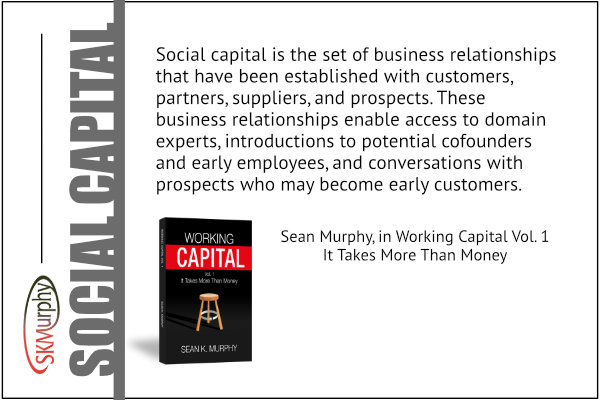In his book “Working Capital Vol 1: It Takes More Than Money,” Sean Murphy defines social capital as the set of business relationships established with customers, partners, suppliers, and prospects.
What is Social Capital?
In an excerpt from Sean Murphy’s book “Working Capital Vol 1- It Takes More Than Money”, he defines social capital as the value derived from social networks and relationships within a business environment. It encompasses the connections and relationships established with customers, partners, suppliers, and prospects. It’s as much about who you know and as it is how you know them. These contacts could come from:
- Family, friends, and acquaintances
- The firms current suppliers, partners, customers, and advisors
- Co-workers, customers, and suppliers from prior employment
- Alumni: classmates and teachers from high school, college, and university
- Industry, professional, or association memberships
- Permission to contact lists (e.g., mailing lists)
Trust: Predictable Actions and Words Aligned with Deeds
Trust is an essential element to establishing and maintaining a business relationship, either at a personal or organization level. It’s at the core of developing good social capital. Trust is built slowly over repeated interactions where entrepreneurs deliver time and again, the results that they promised. And many entrepreneurs get a jolt in their new venture when they discover that their credibility with strangers, which was once freely granted by virtue of their employer, must now be earned one painstaking step at a time.
Good standing in the professional world is less about personality and likability, and more about authenticity and predictability. You are trustworthy to the extent that your actions are predictable and your words align with your actions. This means that you follow through on your commitments. In most situations, the product’s performance or service results will always make a bigger impact than individual personality.
Working Capital Spans Financial, Intellectual, and Social Capital

Social capital is an essential asset to building a business, it enables:
- Access to domain experts
- Introductions to potential co-founders and early employees
- Conversations with prospects and early customers
- Referrals and recommendations
- Collaboration and partnerships
In Sean’s book, he also covers financial and intellectual capital. He highlights how three types of working capital–financial, intellectual, and social–are needed to establish and scale a viable business.
Related Blog Posts
- A Practical Introduction to Social Capital for Entrepreneurs
- Treat Social Capital With the Same Care as Cash
- Networking in Silicon Valley in 2023
- Five Tips For Activating Your Network of Relationships
- Building, Borrowing, and Keeping Trust
- Building a Business Requires Building Trust
- Experiments vs. Commitments
- Build a B2B MVP that Inspires Trust
